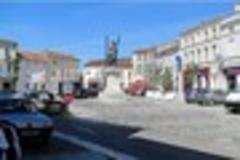 This is Devon -- A Westcountry town has this week been voted one of the best places to live in the UK – we asked WMN editor-at-large Martin Hesp to outline his ideas for municipal happiness;.
This is Devon -- A Westcountry town has this week been voted one of the best places to live in the UK – we asked WMN editor-at-large Martin Hesp to outline his ideas for municipal happiness;.What makes for a perfect community? That was a question I was pondering this week after the WMN reported that Colyton in Devon had been voted one of the very best places in the country to bring up a family.
Good old Colyton – I've always liked the place tucked down there among the soft green Devon hills. It has the feel of ages about it and is a place that seems to have evolved slowly and imperceptibly out of the local sandstones over centuries.
Which, I believe, is probably a very good basis for anyone who is trying to draw together a recipe for community-perfection. Like some old wine, human settlements can grow better with age.
To continue the culinary analogy – I think anyone attempting to devise a good wholesome place in which to live would be better off following the slow-food movement, rather than relying on the fast-food take-away that some modern urban-planners would knock up in a jiffy in answer to the present Government's appetite for putting development above common sense.
What might look good, sizzling and alluring for a few hungry seconds will appear congealed, weary and disgusting once the first pangs of development-desire have been sated. It's why some new towns somehow share the appearance of a half-eaten hamburger lying in a gutter just a few years after some politician has greedily tucked into the trough of publicity which greeted their opening.
That isn't to say new-built communities must always be the stuff of tomorrow's land-fill. However, I would say that urban planners ought to look back at history more than they eye a greedy future.
In Europe that vague thing we know as modern life began in ancient Greece. Down there amid the Hellenic peninsulas and islets, the first proper city-states were formed when people started to live together in communities. In doing so, the limited confines of individual endeavour were replaced by the power inherent in the act of pulling together. Some of these so-called city-states were little more than villages – nevertheless, such places quickly evolved to hold great sway. Democracy was born, armies were formed, education and healthcare developed.
Not bad 5,000 years ago when the men and women of Dartmoor and Exmoor were running about in fur-loin-cloths using their collective idea of technology to make a flint arrowhead.
Fast-forward 50 centuries and many villages around the Mediterranean still exist on a basic model which those ancient Greeks would recognise. The main emphasis being that they are very human places. They are not there for the benefit of commerce, or the internal combustion engine, or the municipal leaders or politicians, or one person's greed, or anything else.
They are there to be lived in. And they have evolved around that single necessity.
Close your eyes and imagine any hilltop village in any Mediterranean country from Turkey to Spain and I bet one of the first things you envisage will be a central square – 99 out of a 100 such places have them. It's where the people go before they set off for the fields or to the sea and where they return and gather during the evenings. It is where children play in the afternoons, and where old folk sit around watching them while gossiping and passing the time of day.
This, to me, is a vital component of good healthy societal living. The idea that the young see the old – and that the old not only enjoy seeing the young, but help look after, guide and inform them. Compare that with what we do. A lot of our schools are like Fort Knox nowadays, places in which children are shut away from the rest of the community. As for old people, we sweep 'em away into special homes where they're neither seen nor heard.
If I was designing a modern community, the first thing I'd do would be to place the old folks' home or day-centre in the same campus as the school. And I'd make both open out on to the central, car-free, square or plaza where the main shops, bars, restaurants, community centre and place of worship were located, so that all human life was included in an immediate mix.
This very pubic frontage in itself would ensure a thousand eyes were watching out for the young generation rather than a few "big-brother" security cameras. The community-mantra that seems to say, "Your formative years will be spent unseen behind a gate – and your final years will end the same" would be turned on its head.
Ask me where the foundations of what could be called a "perfect community" exist and I can only answer that it is a place that must first be cemented in the mind or in the psyche. Children that grow up realising that they are a part of a whole – realising that one day they will grow old, wrinkled, and die and that this is a healthy thing to do – won't be so inclined to smash the community up in their teenage years, but they will learn respect.
And we could do with a bit more of that. Reported by This is 1 week ago.